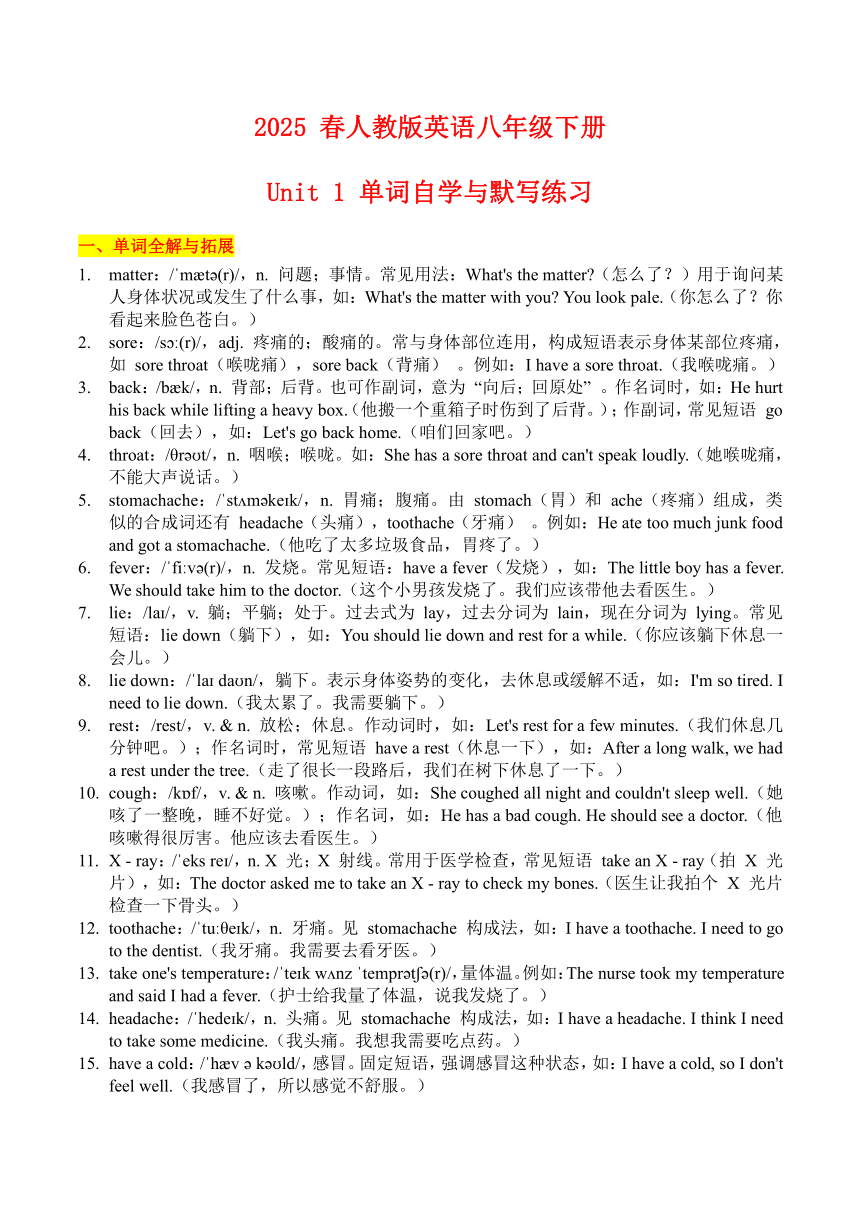
2025 春人教版英语八年级下册 Unit 1 单词自学与默写练习 一、单词全解与拓展 matter:/ m t (r)/,n. 问题;事情。常见用法:What's the matter (怎么了?)用于询问某人身体状况或发生了什么事,如:What's the matter with you You look pale.(你怎么了?你看起来脸色苍白。) sore:/s (r)/,adj. 疼痛的;酸痛的。常与身体部位连用,构成短语表示身体某部位疼痛,如 sore throat(喉咙痛),sore back(背痛) 。例如:I have a sore throat.(我喉咙痛。) back:/b k/,n. 背部;后背。也可作副词,意为 “向后;回原处” 。作名词时,如:He hurt his back while lifting a heavy box.(他搬一个重箱子时伤到了后背。);作副词,常见短语 go back(回去),如:Let's go back home.(咱们回家吧。) throat:/θr t/,n. 咽喉;喉咙。如:She has a sore throat and can't speak loudly.(她喉咙痛,不能大声说话。) stomachache:/ st m ke k/,n. 胃痛;腹痛。由 stomach(胃)和 ache(疼痛)组成,类似的合成词还有 headache(头痛),toothache(牙痛) 。例如:He ate too much junk food and got a stomachache.(他吃了太多垃圾食品,胃疼了。) fever:/ fi v (r)/,n. 发烧。常见短语:have a fever(发烧),如:The little boy has a fever. We should take him to the doctor.(这个小男孩发烧了。我们应该带他去看医生。) lie:/la /,v. 躺;平躺;处于。过去式为 lay,过去分词为 lain,现在分词为 lying。常见短语:lie down(躺下),如:You should lie down and rest for a while.(你应该躺下休息一会儿。) lie down:/ la da n/,躺下。表示身体姿势的变化,去休息或缓解不适,如:I'm so tired. I need to lie down.(我太累了。我需要躺下。) rest:/rest/,v. & n. 放松;休息。作动词时,如:Let's rest for a few minutes.(我们休息几分钟吧。);作名词时,常见短语 have a rest(休息一下),如:After a long walk, we had a rest under the tree.(走了很长一段路后,我们在树下休息了一下。) cough:/k f/,v. & n. 咳嗽。作动词,如:She coughed all night and couldn't sleep well.(她咳了一整晚,睡不好觉。);作名词,如:He has a bad cough. He should see a doctor.(他咳嗽得很厉害。他应该去看医生。) X - ray:/ eks re /,n. X 光;X 射线。常用于医学检查,常见短语 take an X - ray(拍 X 光片),如:The doctor asked me to take an X - ray to check my bones.(医生让我拍个 X 光片检查一下骨头。) toothache:/ tu θe k/,n. 牙痛。见 stomachache 构成法,如:I have a toothache. I need to go to the dentist.(我牙痛。我需要去看牙医。) take one's temperature:/ te k w nz tempr t (r)/,量体温。例如:The nurse took my temperature and said I had a fever.(护士给我量了体温,说我发烧了。) headache:/ hede k/,n. 头痛。见 stomachache 构成法,如:I have a headache. I think I need to take some medicine.(我头痛。我想我需要吃点药。) have a cold:/ h v k ld/,感冒。固定短语,强调感冒这种状态,如:I have a cold, so I don't feel well.(我感冒了,所以感觉不舒服。) stomach:/ st m k/,n. 胃;腹部。复数形式为 stomachs,如:He has a pain in his stomach.(他胃疼。) ache:/e k/,v. & n. 疼痛。常与身体部位组合成复合词表示某部位疼痛,单独使用时,如:My leg aches.(我的腿疼。) earache:/ re k/,n. 耳痛。见 stomachache 构成法,如:The little girl has an earache and is crying.(这个小女 ... ...
~~ 您好,已阅读到文档的结尾了 ~~